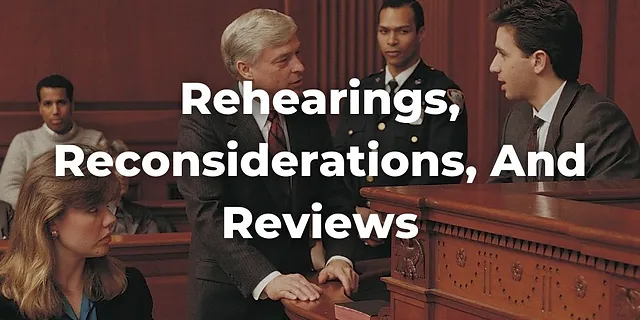What Happens If You Lose an Appeal: Understanding the Consequences
When involved in a legal dispute, appealing a court’s decision is a common recourse. However, not all appeals result in a favorable outcome. If you find yourself on the losing end of an appeal, it’s essential to understand the potential consequences. In this article, we will explore what happens when you lose an appeal and shed light on the implications it may have on your case and future legal options.
1. The Finality of the Decision
One of the significant consequences of losing an appeal is the finality of the decision. When an appeal is denied or dismissed, the ruling of the lower court becomes binding and enforceable. This means that the unfavorable outcome you sought to challenge now stands, potentially impacting your rights, obligations, and legal standing.
Implications:
• Compliance: Losing an appeal often requires complying with the original court’s decision, which may involve financial payments, penalties, or other legal obligations.
• Precedent: An unfavorable appellate decision could set a precedent that affects similar cases in the future, potentially limiting legal avenues for others facing similar circumstances.
• Exhaustion of Remedies: Losing an appeal may exhaust your available legal remedies within the current jurisdiction, making it challenging to pursue further avenues for redress.
2. Limited Scope for Further Appeals
When an appeal is unsuccessful, the options for further appeals become limited. In most jurisdictions, there are specific rules and procedures governing the appeals process. These rules outline the circumstances under which a higher court will review a case. Losing an appeal may restrict your ability to pursue additional appeals, limiting your chances of overturning the original decision.
Implications:
• Dismissal with Prejudice: Some appellate decisions may be dismissed with prejudice, meaning that you are permanently barred from re-filing the appeal or seeking any other recourse for the same matter.
• Grounds for Appeal: Losing an appeal may restrict your ability to raise certain legal arguments or introduce new evidence in future proceedings, as those issues may have been considered and rejected during the appellate process.
• Time and Resources: Pursuing further appeals can be time-consuming, costly, and emotionally draining. Losing an appeal may force you to evaluate the feasibility of continuing the legal battle.
3. Financial and Emotional Impact
An unfavorable appellate decision can have significant financial and emotional consequences for the parties involved. Legal disputes often involve substantial costs, including attorney fees, court fees, and expenses related to gathering evidence. Losing an appeal means that these expenses may be irrecoverable, leaving you responsible for the financial burden.

Implications:
• Attorney Fees: Losing an appeal may result in the loss of attorney fees incurred during the appellate process. Depending on the agreement with your lawyer, you may still be liable for those fees, even if the appeal is unsuccessful.
• Additional Costs: In some cases, losing an appeal may result in additional costs imposed by the opposing party, such as their attorney fees or expenses related to the appeal.
• Emotional Toll: Legal battles can be emotionally draining, and losing an appeal can intensify the disappointment, frustration, and stress experienced throughout the process.
4. Exploring Alternative Dispute Resolution
After losing an appeal, it may be worth considering alternative dispute resolution methods to find a resolution outside of the courtroom. Mediation or arbitration can provide an opportunity for both parties to negotiate and reach a mutually agreeable settlement. While alternative dispute resolution methods may not overturn the original court decision, they can offer a more efficient and cost-effective way to resolve the dispute and move forward.

Implications:
• Mediation: Mediation involves a neutral third party who facilitates communication between the parties to help them find common ground and reach a settlement. It can be a less adversarial approach compared to litigation and may allow for more creative solutions.
• Arbitration: Arbitration involves presenting the dispute to a neutral arbitrator or a panel of arbitrators who render a binding decision. While it resembles a trial, arbitration is generally less formal and more flexible, with the parties having more control over the process.
• Negotiation: Direct negotiation between the parties, with or without legal representation, can also be an option. It allows for open discussion and potential compromises, giving both parties a chance to voice their concerns and find a middle ground.
5. Seeking Legal Advice
If you lose an appeal, it’s crucial to consult with an experienced attorney to assess your options and understand the potential implications. An attorney can provide guidance on the best course of action based on the specifics of your case and jurisdiction. They can help you navigate the legal landscape, explore alternative strategies, or evaluate the possibility of pursuing further legal avenues, if available.
Implications:
• Case Evaluation: An attorney can review your case, assess the strengths and weaknesses, and provide an objective analysis of the likelihood of success in further legal proceedings or alternative dispute resolution methods.
• Legal Strategy: Based on their expertise, an attorney can devise a legal strategy that aligns with your goals and maximizes your chances of achieving a favorable outcome, whether through negotiation, settlement, or further litigation.
• Legal Procedures: Navigating the legal system can be complex, and an attorney can ensure that you comply with all necessary procedures and deadlines, protecting your rights and preventing potential pitfalls.
Conclusion
Losing an appeal can have significant consequences, including the finality of the decision, limited options for further appeals, financial and emotional impact, and the need to explore alternative dispute resolution methods. Understanding these implications is essential for individuals involved in legal disputes to make informed decisions about their cases. Seeking legal advice from an experienced attorney can provide guidance and help navigate the complexities of the legal system. While losing an appeal may be disheartening, it does not necessarily mark the end of the road. Exploring alternative approaches and considering future legal options can provide opportunities to find resolution and move forward. For Sydney family & criminal defence lawyers appeals see here.
In summary, it’s crucial to be prepared for the potential outcomes when pursuing an appeal, but also to remain resilient and explore all available options to protect your rights and seek a just resolution to your legal dispute.





